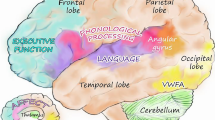Abstract
Methodological difficulties are identified in the assessment of children's comprehension of relative clauses (RCs) by means of the standard acting-out procedure. An alternative experimental task is proposed which attempts to minimize these difficulties while exploring the advantages of the acting-out technique. An experiment is reported in which Portuguese-speaking 3- to 6-year olds were tested by means of this alternative task. The results show children being affected by both the position and the focus of the RC in the same way adults have been reported to be and an error analysis suggests that most of children's difficulties can be ascribed to memory overload while RCs are processed as noun modifier sentences. These results contradict the view that there are developmental differences with regard to the way sentences with RCs are parsed and that processing load induces errors particularly manifested in right-branching subject focus sentences. Developmental changes taking place between the ages of 3 and 6 are considered and questions are raised concerning development from the age of 5.
Similar content being viewed by others
References
Baird, R., & Koslick, I. (1974). Recall of grammatical relations within clause-containing sentences.Journal of Verbal Learning and Verbal Behavior, 3, 165–171.
Bever, T. G. (1970). The cognitive basis for linguistic structures. In J. R. Hayes (Ed.)Cognition and the development of language. New York: John Wiley & Sons.
Bowerman, M. (1979). The acquisition of complex sentences. In P. Fletcher & M. Garman (Eds.),Studies in language acquisition. Cambridge: Cambridge University Press.
Clancy, P., Lee, H., & Zoh, M. (1986). Processing strategies in the acquisition of relative clauses: Universal principles and language specific relations.Cognition.24, 225–262.
Clifton, C., & Frazier, L. (1989). Comprehension sentences with long-distance dependencies. In G. N. Carlson and M. K. Tanenhaus (Eds.),Linguistic structure and language processing (pp. 273–318). Dordrecht: Klewer.
Corrêa, L. M. S. (1982). Strategies in the acquisition of relative clauses. In J. Aitchison and N. Harvey (Eds.),Working Papers of the London Psycholinguistic Research Group, 4, 37–49.
Corrêa, L. M. S. (1986).On the comprehension of Relative Clauses: A developmental study with reference to Portuguese. Unpublished doctoral dissertation, University of London.
Corrêa, L. M. S. (1995). The relative difficulty of children's comprehension of relative clauses: A procedural account. In K. Nelson & Z. Réger (Eds.),Children's language (Vol. VIII). Hillsdale, NJ: Erlbaum.
De Villiers, J. G., Flusberg, H. B. T., Hakuta, K., & Cohen, M. (1979). Children's comprehension of relative clauses.Journal of Psycholinguistic Research, 8(5), 499–518.
Flores d'Arcais, G. B., & Schreuder, R. (1983). The process of language understanding: A few issues in contemporary psycholinguistics. In G. B. Flores d'Arcais & R. J. Jarvella (Eds.),The process of language understanding. Chichester, England: John Wiley and Sons.
Fluck, M. J. (1977). Young children's comprehension of complex sentences.Language and Speech, 20, 48–66.
Fluck, M. J. (1978). Comprehension of relative clauses by children aged five to nine years.Language and Speech, 21, 190–201.
Goodluck, H., & Tavakolian, S. (1982). Competence and processing in children's grammar of relative clauses.Cognition, 11, 1–27.
Hakuta, K. (1981). Grammatical description versus configurational arrangement in language acquisition: The case of relative clauses in Japanese.Cognition.9, 197–226.
Hamburger, H., & Crain, S. (1982). Relative acquisition In S. Kuczaj (Ed.).Language development: Syntax and semantics. L. Hillsdale, NJ: Erlbaum.
Hamburger, H., & Crain, S. (1984). Acquisition of cognitive compilingCognition, 17, 85–136.
Jackendoff, R. (1977).X Syntax: A study of phrase structure. Cambridge, MA: M.I.T. Press.
Labelle, M. (1990). Predication, WH-movement and the development of relative clauses.Language Acquisition, 1, 95–120.
Limber, J. (1973). The genesis of complex sentences. In T. E. Moore (Ed.),Cognitive development and the acquisition of language. New York: Academic Press.
Limber, J. (1976). unravelling competence, performance and pragmatics in the speech of young children.Journal of Child Language, 3, 309–318.
Marslen-Wilson, W. D., & Tyler, L. K. (1978). The temporal structure of spoken language understanding.Cognition, 8, 1–71.
Menyuk, P. (1969).Sentences children use. Cambridge, MA: MIT Press.
Prideaux, G. D. (1979). The acquisition of relative clauses: A functional analysis.Canadian Journal of Linguistics 24, 25–40.
Schachter, P. (1973). Focus and relativization.Language, 49(1), 19–42.
Sheldon, A. (1974). The role of parallel function in the acquisition of relative clauses in English.Journal of Verbal Learning and Verbal Behavior, 13, 272–281.
Sheldon, A. (1977). On strategies for processing relative clauses: A comparison of children and adults.Journal of Psycholinguistic Research, 6, 305–318.
Tarallo, F. (1983).Relativization strategies in Brazilian Portuguese. Unpublished doctoral dissertation, University of Pennsylvania.
Tavakolian, S. (1981). The conjoined clause analysis of relative clauses. In S. L. Tavakolian (Ed.),Language acquisition and linguistic theory. Cambridge, MA: MIT Press.
Townsend, D. J., Ottaviano, D., & Bever, T. G. (1979). Immediate memory for words from main and subordinate clauses at different age levels.Journal of Psycholinguistic Research, 8, 31–101.
Tyler, L. K. (1981). Syntactic and interpretative factors in the development of language comprehension. In W. Deutsch (Ed.),The child's construction of language. London: Academic Press.
Vergnaud, J. R. (1984).French relative clauses. Unpublished doctoral dissertation, MIT.
Wanner, E., & Maratsos, H. (1978). An ATN approach to comprehension. In M. Halle, J. Bresnan, & G. A. Miller (Eds.),Linguistic theory and psychological reality. Cambridge MA: MIT Press.
Author information
Authors and Affiliations
Additional information
The research reported here was carried out while the author read for the PhD degree at the University of London. The writing up of this paper was financially supported by a postdoctoral grant from the Brazilian Research Council (CNPq: 302103-86.4).
Rights and permissions
About this article
Cite this article
Corrêa, L.M.S. An alternative assessment of children's comprehension of relative clauses. J Psycholinguist Res 24, 183–203 (1995). https://doi.org/10.1007/BF02145355
Accepted:
Issue Date:
DOI: https://doi.org/10.1007/BF02145355




